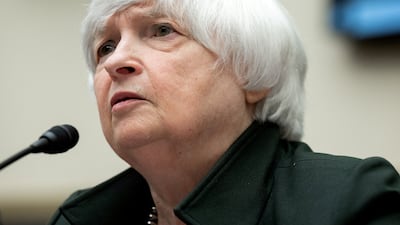US Treasury Secretary Janet Yellen on Sunday said that a failure by Congress to act on the debt ceiling could lead to a "constitutional crisis" that would also call into question the federal government's creditworthiness.
Ms Yellen sounded the alarm over possible financial market consequences if the debt ceiling is not raised by early June, when she has said the federal government could run short of cash to pay its bills.
The negotiations on the issue should not take place "with a gun to the head of the American people", she told the ABC.
President Joe Biden has asked Congress to raise the debt ceiling without conditions.
The Republican-led House of Representatives last month passed a bill that would raise the government's $31.4 trillion debt ceiling, but it included sweeping spending cuts over the next decade, which Mr Biden and his fellow Democrats oppose.
Mr Biden is preparing to meet on Tuesday at the White House with Republican House Speaker Kevin McCarthy, Republican Senate minority leader Mitch McConnell and top congressional Democrats to discuss the issue.
"It's Congress's job to do this. If they fail to do it, we will have an economic and financial catastrophe that will be of our own making," Ms Yellen said.
"And we should not get to the point where we need to consider whether the President can go on issuing debt. This would be a constitutional crisis."
She was alluding to the delineation of powers of the executive and legislative branches under the US Constitution.
Mr Biden has steadfastly said he will not negotiate over the debt ceiling increase, but would discuss budget cuts after a new limit is passed.
Congress has often paired debt-ceiling increases with other budgetary and spending measures.
Washington regularly sets a limit on federal borrowing. Currently, the ceiling is equal to about 120 per cent of the country's annual economic output.
The debt reached that ceiling in January and the Treasury Department has kept obligations just within the limit, but by July or August, Washington could have to stop borrowing altogether.
Under that scenario, shockwaves could ripple through global financial markets as investors question the value of US bonds, which are regarded as among the safest investments and serve as building blocks for the world's financial system.
The House-passed bill would pare spending to 2022 levels and then cap growth at 1 per cent a year, repeal some tax incentives for renewable energy and stiffen work requirements for some anti-poverty programmes.

